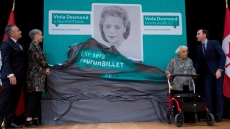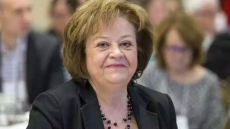OTTAWA — Foreign Affairs Minister Stephane Dion has given a label to Canada's new Liberal foreign policy: responsible conviction.
Dion says it is the guiding principle for the new directions the Liberal government has adopted towards the world.
The minister says the concept incorporates a few old Conservative ideas, but also aims to reverse the previous government's "disengagement" approach to global affairs.
The Liberals point to a new focus on multilateralism and the United Nations, re-engaging the United States, fighting climate change, talking to Russia and Iran, opposing the death penalty for Canadians in prison abroad, and a different approach to fighting the Islamic State of Iraq and the Levant.
Dion says the concept also explains the common ground the Liberals continue to share with the Conservatives, including carrying on its maternal, newborn child health initiative — but adding funding for abortion and family planning — as well as continuing to sell billions in military hardware to Saudi Arabia.
Dion is using a speech at the University of Ottawa to put his own stamp on Canada's foreign policy, adding some philosophical gravitas to Prime Minister Justin Trudeau's mantra that Canada "is back" in world affairs.
"This formulation means that my values and convictions include the sense of responsibility," Dion said in a prepared text.
The former university professor references the thinking of the early 20th century German sociologist Max Weber in his speech.
"Our government shares the same conviction as the previous government, but it assesses the consequences of its chosen method of promoting this conviction differently."
Dion uses that rationale to defend the controversial decision by the Conservatives to sell $15-billion in light armoured vehicles to Saudi Arabia. The Liberals are upholding the deal in the face of howling protests from human rights' organizations that cite Saudi Arabia's crackdown on dissent and its subjugation of women, among other things.
"Of course I would like to live in a world without weapons. But my peaceful conviction must take the real world into account if I want to be a responsible decision maker," says Dion, who says cancelling the deal would put thousands of Canadians out of work and harm its international reputation in other ways.
Dion reiterated the government's intent to assess how he grants future export permits so they conform to Canada's interests, including the promotion of human rights.
Dion said Canada will have its eyes open as it re-opens communication channels with authoritarian regimes such as Iran and Russia.
The speech echoes much of what Dion has said in the House of Commons in recent months in reply to Conservative attacks on the government's approach to those two countries, as well as its decision to withdraw fighter jets from the anti-ISIL coalition in favour of adding more special forces trainers on the ground in Iraq.
Dion goes on the offensive, accusing the previous Harper government of isolating Canada on the world stage by practising a policy of "disengagement."
In what appears to be a personal jab at the hockey-loving Stephen Harper, Dion suggests the 1972 Canada-Russia hockey series — including Paul Henderson's iconic winning goal — likely would never have happened if Canada had scaled back ties to Soviet Union during the Cold War.
Dion recasts Canada's so-called honest broker role, which the Conservatives savaged as a sign of weakness in foreign policy.
"Since the classic concept of the honest broker is now too often confused with moral relativism or the lack of strong convictions, I prefer to say that Canada must be a fair-minded and determined peace builder."



